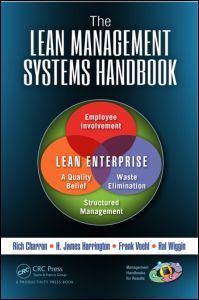Description
The Lean Management Systems Handbook
Management Handbooks for Results Series
Language: English
Subjects for The Lean Management Systems Handbook:
Keywords
Lean Manufacturing Implementations; Lean Management System; Lean Management Systems; Cycle Time; Lean; Hoshin Kanri; Lean manufacturing; Business Process; Sustainable Lean management; Lean Management; Lean company culture; Organizational Master Plan; Frank Voehl; Lean Organization; LSS Organization; LSS Practitioner; Leader Standard Work; Kaizen Teams; Lean Tools; Stream Mapping Tools; Lean Initiatives; Lean Concepts; LSS Concept; Pull Production; Asset Management; Henry Ford; Lean Design; LSS Tool; Lean Learning; 5S Program
300 p. · 15.6x23.4 cm
Description
/li>Contents
/li>Readership
/li>Biography
/li>
Performance management, the primary focus of a Lean organization, occurs through continuous improvement programs that focus on education, belief systems development, and effective change management. Presenting a first-of-its-kind approach,The Lean Management Systems Handbook details the critical components required for sustainable Lean management.
Positioning Lean as a management operational philosophy far beyond the traditional set of improvement tools, the book explains how managers at all levels of the organization can integrate Lean into their daily management activities. It defines the Lean philosophy as well as the beliefs and behaviors required to develop a thriving Lean company culture.
The book captures the essence of Lean learning and Lean doing and illustrates practical applications of Lean management. It begins by covering the basics that encompass Lean management and leadership in two critical areas: maintenance/control and improvement.
After reading this book, you will better understand how to see waste, measure waste, eliminate waste, and develop an active change improvement workplace. You will also gain the practical understanding required to determine which Lean tool is best suited to your particular need for supporting an organization-wide management system.
Expounding on essential Lean concepts, this is an ideal guide to help new managers and leaders make the transition from theory to successful application in the field. Complete with brief summaries and examples of the most important tools in Lean management systems development in each chapter, the book provides a reliable roadmap for deploying a Lean management system across your organization, and subsequently across your entire value stream.
Introduction to Lean Management. History of Lean. House of Lean (Foundations of a Lean Management System). Lean Management Systems. Lean Socio-Technical System: on Developing a Lean Culture. Lean Educational System. Waste Identification. Waste Quantification: Learning to Measure. Lean Concepts, Tools, and Methods. Three Faces of Change: Kaizen, Kaikaku, and Kakushin. Lean Thinking 101. Integrating Lean Management with DMAIC/DMADV. Integrating Lean and Theory of Constraints. Lean Management System: Organizational Master Plan In a Nutshell. The Need for Facilitation. Facilitating Lean Management Systems (Developing A Lean Culture and Change Management Environment).
Richard M. Charron is the founder and president of The Lean Manufacturing Group, a South Florida company that provides a number of hands-on Employee Learning & Lean Implementation programs focused on waste elimination, productivity improvement, and profitability enhancement. He is a Certified Master Black Belt in Lean Six Sigma Excellence from the Harrington Institute. He has trained and coached over 100 teams in Lean manufacturing, Lean Six Sigma, and Kaizen events generating savings over $25MM. In conjunction with Strategy Associates, he completed a three-part DVD series on Lean concepts for the University of Central Florida. His expertise is in process performance excellence, Lean Six Sigma, Lean manufacturing, design for manufacturability, problem solving, product and process failure analysis, products development, and performance testing. Mr. Charron earned BS and MS degrees in plastics engineering from the University of Massachusetts. His MS Thesis "Product Liability in the Plastics Industry" is a survey of our legal system that spans the impacts of unsafe products and the ever-changing legal uncertainties. He is the author of a dozen technical publications on product quality, products performance testing, and products failure analysis.
In the book, Tech Trending, H. James Harrington was referred to as "the quintessential tech trender." The New York Times referred to him as having a "… knack for synthesis and an open mind about packaging his knowledge and experience in new ways—characteristics that may matter more as prerequisites for new economy success than technical wizardry…." Tom Peters, the author, stated, "I fervently hope that Harrington’s readers will not only benefit from the thoroughness of his effort but will also ‘smell’ the fundamental nature of the challenge for change that he mounts." William Clinton, past president of the United States, appointed Dr. Harrington to serve as an Ambassado




